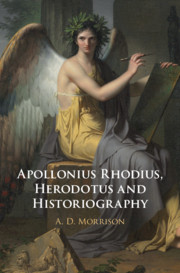Book contents
- Apollonius Rhodius, Herodotus and Historiography
- Apollonius Rhodius, Herodotus and Historiography
- Copyright page
- Dedication
- Contents
- Preface
- Abbreviations
- Introduction
- Chapter 1 Receiving Herodotus
- Chapter 2 Creating Authorities
- Chapter 3 Explaining the Past
- Chapter 4 Telling Stories
- Chapter 5 Greeks and Non-Greeks
- Chapter 6 Kings and Leaders
- Conclusions and Consequences
- Select Bibliography
- Index of Subjects
- Index of Passages
Chapter 6 - Kings and Leaders
Published online by Cambridge University Press: 13 January 2020
- Apollonius Rhodius, Herodotus and Historiography
- Apollonius Rhodius, Herodotus and Historiography
- Copyright page
- Dedication
- Contents
- Preface
- Abbreviations
- Introduction
- Chapter 1 Receiving Herodotus
- Chapter 2 Creating Authorities
- Chapter 3 Explaining the Past
- Chapter 4 Telling Stories
- Chapter 5 Greeks and Non-Greeks
- Chapter 6 Kings and Leaders
- Conclusions and Consequences
- Select Bibliography
- Index of Subjects
- Index of Passages
Summary
One of the most important features of the political organisation of the Hellenistic period was the division of an expanded Greek world into a number of large, powerful states ruled over by kings.1 This was a major change as compared with fifth-century Greece, where monarchy was either foreign (most notably in the shape of βασιλεύς,2 the King, i.e. the king of Persia) or peripheral to the core of classical Greek city-states, to be found on the margins of the Greek world in such places as Sicily, Cyrene or Cyprus.3 The situation had already begun to change in the fourth century, with the rise of the Macedonian monarchy under Philip II and then Alexander, but the place and justification of kingship within Greek culture remained a focus for Greek thinking well into the Hellenistic period,4 in large part because the much greater size and much broader cultural and ethnic diversity of most of the Hellenistic kingdoms meant the relationship of kingship to notions of Greek identity was complex and itself underwent substantial change.5 This chapter examines in particular the portrayal of kings and leaders in the Argonautica to determine the degree to which we should see it as playing a role in justifying or promoting the notion of Hellenistic kingship, especially by providing exemplars or models for Hellenistic kings, royal practices or institutions. As such it follows directly from the consideration in theof the consequences of the interaction with Herodotus (and historiography more broadly) for readings situating the epic within its socio-political context. We shall begin by reviewing briefly the main aspects of Hellenistic kingship ideology, in order to reconstruct part of the horizon of expectations of a Hellenistic reader of the Argonautica, before moving on to survey the reflections of Hellenistic royal practice and ideology that we can discern in the poem and the implications of these for the notion of the epic’s kings and leaders as exemplary. I argue that the pervasive complicating of these characters, especially through intertextual engagement with negative depictions of monarchy, in particular in Herodotus, means we should not regard them as providing potential straightforward models for Hellenistic kingship, or as straightforwardly promoting elements of Ptolemaic royal ideology, even where its practices and patterns are evoked by Apollonius.
- Type
- Chapter
- Information
- Apollonius Rhodius, Herodotus and Historiography , pp. 179 - 208Publisher: Cambridge University PressPrint publication year: 2020

